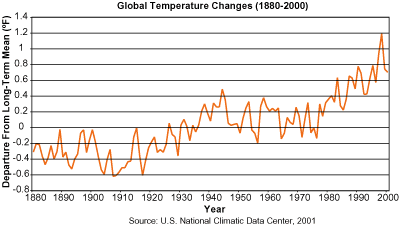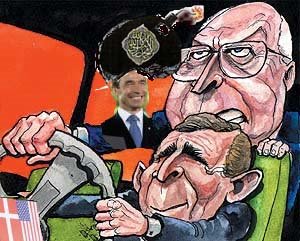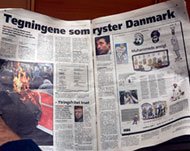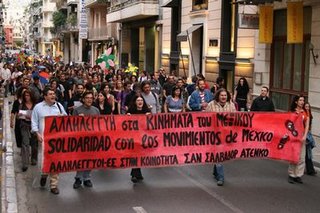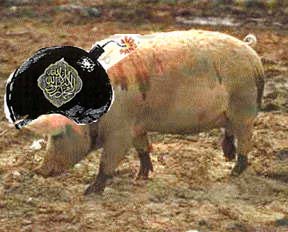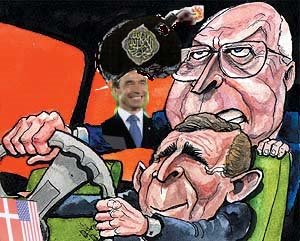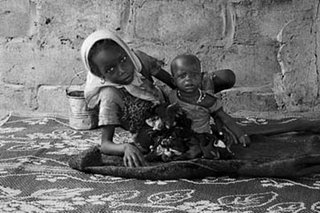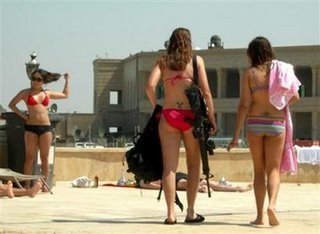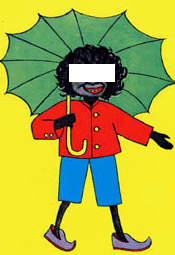
 ("Little black Sambo - icon of Danish children's literature. Now changed for the sake of political correctness. And Blixen)
("Little black Sambo - icon of Danish children's literature. Now changed for the sake of political correctness. And Blixen)
Perhaps it is not so strange after all that it is in Denmark the cartoons crisis strikes. It has been difficult for Danes to view other cultures in an objective light. Danes have taken part in European colonialism, for instance the Belgian king Leopold's imperialist undertakings in the Congo and the building of trading stations in Western Africa. Racism and feelings of superiority have constricted the view of the "native". But the view has also been dominated by the patronising care and solicitude for the "noble savage" who supposedly needs direction in life to be able to reach the highpoints of European civilization.
Now East African intellectuals have started deconstructing Blixen. It is especially the autobiographical "Out of Africa" that is singled out for analysis. It contains passages like:
"
When you have caught the rhythm of Africa, you find that it is the same in all her music. What I learned from the game of the country was useful to me in my dealings with the native people...
"It was not easy to get to know the natives. They were quick of hearing, and evanescent; if you frightened them they could withdraw into a world of their own, in a second, like the wild animals which at an abrupt movement from you are gone — simply are not there. Until you knew a native well, it was almost impossible to get a straight answer from him."
The Nairobi based freelance journalist and consultant Dominic Odipo comments on this passage in "
The Standard":
"Blixen keeps returning to this theme of the similarities between the African natives and the wild animals who lived in the plains. If you want to understand the natives, study the wild animals that live next to them. If you frighten them, they suddenly disappear, like the wild animals that roam those plains. Until you get to know them well, it is almost impossible to get a straight answer from them!"
He also wonders how a Danish baroness could own so much land in Africa. But of course this was due to the British colonisation of the area. The British protected the white farmers' interests, and attempts at rebellion were defeated in the cruelest and most violent fashions, for instance the Mau Mau rebellion. In the eyes of this African, Karen Blixen has done incalculable harm:
"Millions of Europeans and Americans who read Out of Africa in the last century had Blixen’s image of native Africans permanently etched on their minds. To them, all African became savages for whom it was the sacred duty of the white man to come and "civilise", and to exploit without scruple.
These images were passed on to their children and on to their children's children, today our contemporaries. The damage that Karen Blixen did to the image of Africa in the eyes of foreigners is virtually incalculable".
Karen Blixen had a captivating and dominating personality. She was into the esoteric, which can be seen in some of her gothic tales, for instance "A Sailor Boy's Tale", where you follow a young ship hand Simon through a part of his life. He rescues a peregrine falcon from being stuck in the tackle yarn, and that falcon he meets again later as a Lapp woman who helps him to run away from some Russian sailors. The point is: That which you have done, comes back to haunt you. Man has a place in this world, and he is set to follow his destiny: We're part of a universal principle running through the world and all time. We find our place in the world by understanding that principle. In the same way the black savages of Africa have to understand their place in the world. With this background it is difficult to see that a world without masters and slaves may be possible.
As the baroness viewed it, there is a natural order in the world. Everybody has to know his or her place in it. As part of the Danish nobility, Karen Blixen's place was in the upper class. The blacks had their place cut out for them far below.
Young and promising poets and men of letters also had to know their place. Karen Blixen made "secret covenants" with some of the young leading literary figures of her day. Two of them, the poet Thorkild Bjørnvig and the professor of Danish literature Aage Henriksen have written about this covenant that was close to being satanic in its nature. Blixen thought that her spirit could wander and take temporary or permanent residence in these promising young people. When Blixen bewitched Bjørnvig he was 30 years old, and she was 63. Once when he was sick, she let him stay for a long time at her residence Rungstedlund north of Copenhagen. In his book about their relationship Bjørnvig quotes from one of her
letters to him:
"Fortunately there is a human being I can trust, as I trusted Farah. That is why I'll now place my mantle upon you, like Elias did to Elisa, as an omen that some time I shall have three quarters of my Spirit stay with you, Yours, Karen Blixen."
The African commentators have probably not even been aware of this background. Still
one of them, commenting on Odipo's article, concludes:"I read with great interest Mr Dominic Odipo’s pieces on Karen Blixen and her ‘vile mementos and racism in The Standard on April 10 and May 8, 2006. Many Kenyans born after independence tend to react the same way on matters to do with colonialism and racism.
The bigotry that existed as recently as 70 or so years ago and its use to cream the dishonesty, Machiavellian tendencies of colonialism and colonial society is amazing. It will take Kenya a long time to come to terms with colonialism.
Looking at Karen Blixen and her life outside the context of pre-independence Kenya and colonialism is hurtful, can be hateful and may not serve Kenyans of our generation much good. Colonialism, perfecting discrimination of one group of people by another, has been described as "a variety of fascism" and is based on economic privilege, despite suggestion of more noble goals of religious conversion or ‘civilisation’."
The Mohammad cartoons can also be viewed as a kind of belated colonialism. It is high time the deconstruction is carried through to its logical end.
